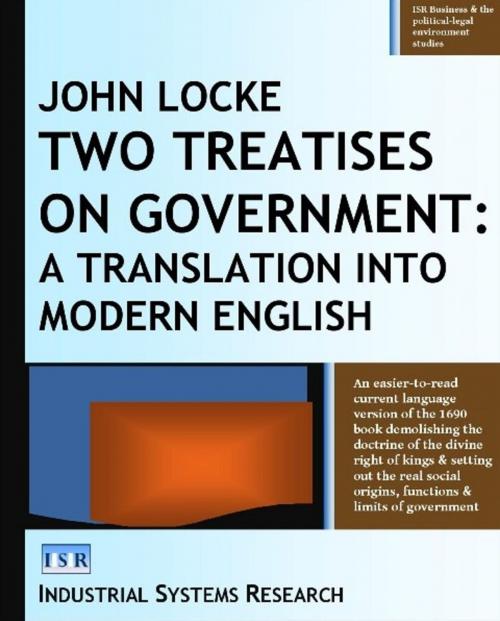Two Treatises on Government
A Translation into Modern English
Nonfiction, Social & Cultural Studies, Political Science, Government, Civics, Politics, Civil Rights, Democracy| Author: | John Locke | ISBN: | 9780906321690 |
| Publisher: | Industrial Systems Research | Publication: | September 6, 2013 |
| Imprint: | Language: | English |
| Author: | John Locke |
| ISBN: | 9780906321690 |
| Publisher: | Industrial Systems Research |
| Publication: | September 6, 2013 |
| Imprint: | |
| Language: | English |
Two Treatises on Government: A Translation into Modern English
John Locke’s 1690 book is one of the most important and influential works on government ever published. The first part demolishes the main authoritarian/totalitarian ideology of its day: the doctrine of the divine right of kings to absolute arbitrary power over their subjects. The second sets out the real social origins, functions and limits of government. Locke demonstrates that far from God and natural law ordaining all-powerful hereditary dictatorship, the only legitimate form of government is one established with the consent of the people and committed to upholding their fundamental human rights to life, liberty, and property.
The book justified the Glorious Revolution establishing parliamentary government in England and was an inspiration behind the American Declaration of Independence a century later. Around the world, it continues to have a profound influence on the theory and practice of limited representative government and protecting basic rights and freedoms under the rule of law.
This is a current language version of the book - essentially translating the work into modern English to improve its readability and understandability.
Contents
Treatise 1
“The Divine Right of Kings”: A Refutation of the Doctrine of Sir Robert Filmer and His Followers
-
Introduction
-
Paternal and Regal Power
-
“Adam’s Title to Sovereignty by Creation”
-
“Adam’s Title to Sovereignty by Donation”
-
“Adam’s Title to Sovereignty by the Subjection of Eve”
-
“Adam’s Title to Sovereignty by Fatherhood”
-
The Notion of Fatherhood and Property as Joint Foundations of Sovereignty
-
The Notion of Conveying Adam’s Sovereign Monarchical Power
-
The Notion of Monarchy by Inheritance from Adam
-
The Notion of an Heir to Adam’s Monarchical Power
-
Who is the Heir?
Treatise 2
The Real Origins, Functions, and Limits of Government
-
Political Power
-
The State of Nature
-
The State of War
-
Slavery
-
Property
-
Paternal Power
-
Political or Civil Society
-
The Beginning of Political Societies
-
The Ends of Political Society and Government
-
Forms of Commonwealth
-
The Limits of Legislative Power
-
The Legislative, Executive, and Federative Powers of the Commonwealth
-
The Subordination of Powers of the Commonwealth
-
Prerogative
-
Paternal, Political, and Despotic Powers: a Comparison
-
Conquest
-
Usurpation
-
Tyranny
-
The Dissolution of Government
Two Treatises on Government: A Translation into Modern English
John Locke’s 1690 book is one of the most important and influential works on government ever published. The first part demolishes the main authoritarian/totalitarian ideology of its day: the doctrine of the divine right of kings to absolute arbitrary power over their subjects. The second sets out the real social origins, functions and limits of government. Locke demonstrates that far from God and natural law ordaining all-powerful hereditary dictatorship, the only legitimate form of government is one established with the consent of the people and committed to upholding their fundamental human rights to life, liberty, and property.
The book justified the Glorious Revolution establishing parliamentary government in England and was an inspiration behind the American Declaration of Independence a century later. Around the world, it continues to have a profound influence on the theory and practice of limited representative government and protecting basic rights and freedoms under the rule of law.
This is a current language version of the book - essentially translating the work into modern English to improve its readability and understandability.
Contents
Treatise 1
“The Divine Right of Kings”: A Refutation of the Doctrine of Sir Robert Filmer and His Followers
-
Introduction
-
Paternal and Regal Power
-
“Adam’s Title to Sovereignty by Creation”
-
“Adam’s Title to Sovereignty by Donation”
-
“Adam’s Title to Sovereignty by the Subjection of Eve”
-
“Adam’s Title to Sovereignty by Fatherhood”
-
The Notion of Fatherhood and Property as Joint Foundations of Sovereignty
-
The Notion of Conveying Adam’s Sovereign Monarchical Power
-
The Notion of Monarchy by Inheritance from Adam
-
The Notion of an Heir to Adam’s Monarchical Power
-
Who is the Heir?
Treatise 2
The Real Origins, Functions, and Limits of Government
-
Political Power
-
The State of Nature
-
The State of War
-
Slavery
-
Property
-
Paternal Power
-
Political or Civil Society
-
The Beginning of Political Societies
-
The Ends of Political Society and Government
-
Forms of Commonwealth
-
The Limits of Legislative Power
-
The Legislative, Executive, and Federative Powers of the Commonwealth
-
The Subordination of Powers of the Commonwealth
-
Prerogative
-
Paternal, Political, and Despotic Powers: a Comparison
-
Conquest
-
Usurpation
-
Tyranny
-
The Dissolution of Government















